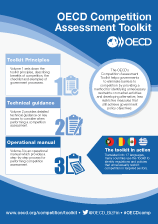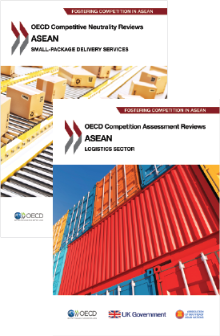Competition
Achieving more pro-competitive regulation in ASEAN
|
In order to increase awareness of the benefits and role of competition in ASEAN, the ACAP 2016-2025 provides for an assessment to be conducted on the impact of non-tariff barriers on competition in the markets of ASEAN Member States followed by recommendations. Within this framework and in co-operation with the UK Government, from 2018 to 2021, the OECD has undertaken ten Competition Assessments of Laws and Regulations in the logistics sector in ASEAN (one assessment of the logistics sector in each individual Member State). Using the OECD Competition Assessment Toolkit, the project aims to help governments identify shortcomings in the regulatory or policy environment that hinder the efficient functioning of markets and damage long-term growth. Moreover, it provides recommendations for beneficial reforms aimed at avoiding unnecessary regulatory restrictions on competition, thus making laws and regulations more competitive. |
How to address these challengesThe OECD Competition Assessment Toolkit is well suited to achieve these outcomes as it is specifically designed to identify shortcomings in the national regulatory and policy environment that hinder the efficient functioning of markets in selected sectors to the detriment of businesses and consumers.
Why the Logistics SectorThe AEC Blueprint lists logistics services among its twelve priority integration sectors. The ASEAN Expert Group on Competition, the ASEAN Secretariat, the OECD and UK Foreign & Commonwealth Office (FCO) agreed that this would be the focus of the Project. The focus on one sector has the potential benefit of making the rules consistent and thus helping promote a more integrated logistics market. Efficient logistics can play a significant role in increasing a country’s economic development by facilitating international trade and improving its competitiveness. By developing an efficient logistics system, a country can enhance its connectivity to better serve its importers and exporters, and satisfy the needs of regionally integrated production facilities for reliable just-in-time delivery of inputs and outputs.
Objectives and outcomesThe Project aimed to support the development of pro-competitive reforms by identifying recommendations to improve shortcomings in the regulatory or policy environment that hinder the efficient functioning of markets, thus damaging long-term growth. As a first step, the project screened the most important laws and regulations in the logistics sector of each member state in order to identify unnecessary regulatory restrictions to competition. Based on this analysis, it then proposes changes to improve the regulatory environment and stimulate growth. Beyond its immediate impact on competition policy, the project aims at laying the foundations for reducing poverty and inequality, lowering non-tariff barriers to trade, and improving the business environment and ease of doing business in ASEAN. A rule-based, predictable environment in line with international best practices will ensure a competitive and open economy and a level playing field for all competitors. This in turn will allow businesses seeking access to ASEAN to enter, operate and invest effectively.
|
Access all reports by country
OECD COMPETITION ASSESSMENT TOOLKIT  |
|||||||||||||||||||||||||||||||||||||||||||
[email protected] | @OECD_BizFin | #OECDcomp

Related Documents









